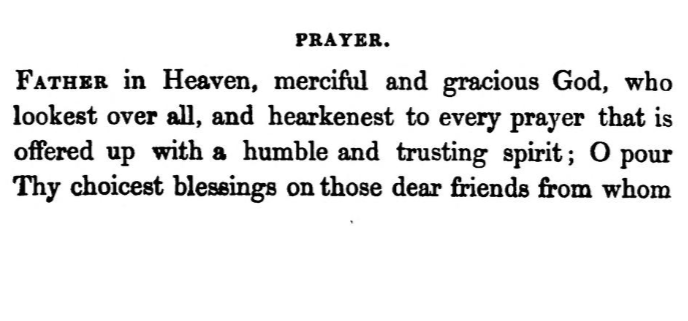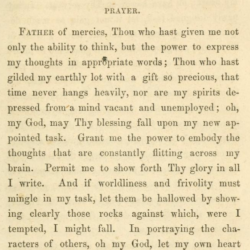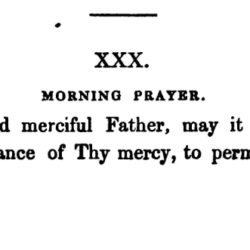Contributor(s): Shared on: 19 May 2023 under the Creative Commons Zero (CC 0) Universal license a Public Domain dedication Categories: Tags: | Contribute a translation | Source (English) |
|---|
|
Prayer. | |
Father in Heaven, merciful and gracious God,
who lookest over all,
and hearkenest to every prayer
that is offered up with a humble and trusting spirit;
O pour Thy choicest blessings on those dear friends
from whom Thou in Thy wisdom hast ordained
that I should be parted. | |
I murmur not, O Lord, at Thy decree,
for I know it is sent in mercy.
Thou seest my heart,
and Thou knowest my affections are so strong,
that were I constantly near them,
my earthly affections might be centred there,
and they might draw my thoughts
from higher objects,
and from Thee. | |
Yet, O Lord my God,
bless all the dear companions of my early youth,
remove the woes of the afflicted from amongst them,
grant that all earthly happiness may be their portion,
and bless them, my God,
with prosperity,
content,
and health;
grant that they may walk in Thy ways,
and praise Thy Holy Name: | |
O so pour Thy Spirit on their souls,
that their prayers may be acceptable to Thee,
in whatever faith they may be offered,
and permit them, O God,
so to pass this life,
as to render them fitted for the next: | |
and if it should please Thee, O my God,
to grant that we may one day meet again,
O permit that friendship which is now so dear,
to shine still pure and holy,
untarnished by absence,
unsullied by distance;
O grant that we may still love each other apart,
as we did when we were together,
and that our affection may last
through joy and gladness,
through sorrow and suffering,
till death divide us. | |
O hear me, Thou Mighty God,
who graciously bestowest on us
the gift of friendship
to sweeten our earthly lot.
Hear me, O Lord my God,
and vouchsafe to answer me.
Amen. |
“Prayer (Father in Heaven),” a prayer for the well-being of friends by Grace Aguilar was published posthumously by her mother Sarah Aguilar in the UK edition of Sacred Communings, pp. 71-72. It is not found in the US edition, although a prayer on the same theme, “Prayer (Oh Gracious and Almighty God)” is found there. Source(s)
 Grace Aguilar (2 June 1816 – 16 September 1847) was an English novelist, poet and writer on Jewish history and religion. Although she had been writing since childhood, much of her work was published posthumously. Among those are her best known works, the novels Home Influence and A Mother's Recompense. Aguilar was the eldest child of Sephardic Jewish refugees from Portugal who settled in the London Borough of Hackney. An early illness resulted in her being educated by her parents, especially her mother, who taught her the tenets of Judaism. Later, her father taught the history of Spanish and Portuguese Jews during his own bout with tuberculosis which had led the family to move to the English coast. After surviving the measles at the age of 19, she began to embark on a serious writing career, even though her physical health never completely recovered. Aguilar's debut was an anonymous collection of poems, The Magic Wreath of Hidden Flowers. Three years later she translated Isaac Orobio de Castro's Israel Defended into English at her father's behest. Later her The Spirit of Judaism drew interest and sales in both Britain and the United States after being published in Philadelphia by Isaac Leeser. He added a preface to the work elucidating his differences with her, the first of many clashes her work would have with mainstream Jewish thought. In the 1840s her novels began to attract regular readers, and Aguilar moved back to London with her parents. Despite her success, she and her mother still had to operate a boys' Hebrew school to stay solvent, which she resented for the time and energy it took from her writing. In 1847, she became ill again with a spinal paralysis which she did not let prevent her from visiting her brother in Frankfurt. Her health worsened and she died there that September. Aharon Varady (M.A.J.Ed./JTSA Davidson) is a volunteer transcriber for the Open Siddur Project. If you find any mistakes in his transcriptions, please let him know. Shgiyot mi yavin; Ministarot naqeni שְׁגִיאוֹת מִי־יָבִין; מִנִּסְתָּרוֹת נַקֵּנִי "Who can know all one's flaws? From hidden errors, correct me" (Psalms 19:13). If you'd like to directly support his work, please consider donating via his Patreon account. (Varady also translates prayers and contributes his own original work besides serving as the primary shammes of the Open Siddur Project and its website, opensiddur.org.) Read a comment / Leave a comment (moderated) Works of related interest: |



![prayer (oh, father, merciful father] (Grace Aguilar 1853) - cropped](https://opensiddur.org/wp-content/uploads/2023/05/prayer-oh-father-merciful-father-Grace-Aguilar-1853-cropped-250x250.png)
![Prayer (Oh, Father, merciful Father) [version 2] / Dedication and Surrender, by Grace Aguilar (ca. 1830s)](https://opensiddur.org/wp-content/uploads/2023/05/dedication-and-surrender-Grace-Aguilar-1853-cropped-250x250.png)
![prayer [for friends] (Grace Aguilar 1853) - cropped](https://opensiddur.org/wp-content/uploads/2023/05/prayer-for-friends-Grace-Aguilar-1853-cropped-250x250.png)


![morning hymn (father of all) [in illness] (Grace Aguilar 1853) - cropped](https://opensiddur.org/wp-content/uploads/2023/05/morning-hymn-father-of-all-in-illness-Grace-Aguilar-1853-cropped-250x250.png)



Leave a Reply